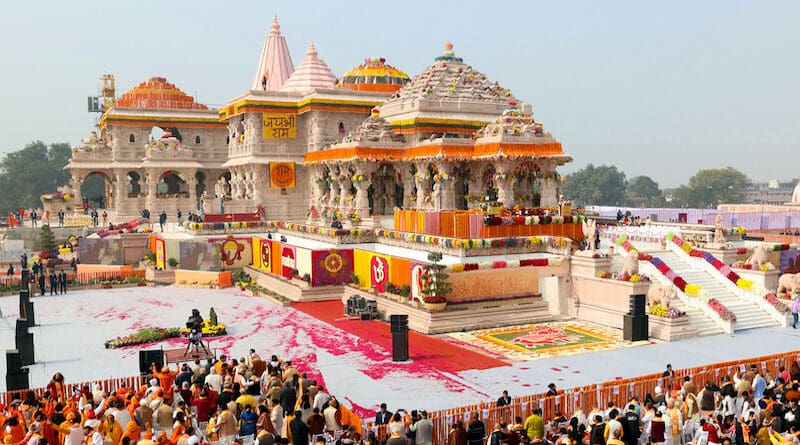The Ram Mandir Inauguration: A Majoritarian Agenda In Action? – OpEd
By Altaf Moti
India has been a secular country since its independence in 1947. However, the recent inauguration of the Ram Mandir at Ayodhya by Prime Minister Narendra Modi has raised concerns about the country’s future as a secular state.
The temple was built on the ruins of a 16th-century Babri mosque, which was destroyed by Hindu nationalists in 1992. The construction of the temple has been a long-standing demand of the Hindu nationalist groups, including Modi’s Bharatiya Janata Party (BJP) and was a source of tension between the Hindu and Muslim communities for many years. The aftermath of the demolition of the Babri Mosque was marked by sectarian violence and communal tensions. The riots that followed the demolition of the mosque were some of the deadliest in India’s history.
Marginalization of the Muslim community
The inauguration of the temple has been celebrated by the Hindu nationalists as a victory of their ideology. However, it has also raised concerns about the marginalization of the Muslim community in India. The construction of the temple on the site of a destroyed mosque has been seen as a symbol of Hindu supremacy over Indian Muslims. The inauguration of the temple has also been criticized by the international community as a violation of the secular principles of the Indian Constitution.
The BJP has been accused of promoting a majoritarian agenda which seeks to establish the dominance of the Hindu community over other religious communities in India. The BJP’s rise to power has been accompanied by a rise in communal violence against Muslims and other minorities in India. The BJP has also been accused of using the Ram Mandir issue to polarize the electorate along religious lines.
The inauguration of the Ram Mandir has been seen as a major milestone in the BJP’s agenda of establishing a Hindu majoritarian state in India. The BJP has been accused of using the temple issue to divert attention from the real issues facing the country such as poverty, unemployment and economic inequality. It’s policies have been criticized for being anti-poor and pro-rich.
Transformation of India from a secular democracy into a Hindu state
The opening of the temple has been seen as a political triumph for Modi who is seeking to transform India from a secular democracy into a Hindu state. The temple’s consecration has been portrayed by Modi’s Bharatiya Janata Party and other Hindu nationalist groups as central to their vision of reclaiming Hindu pride, which they say was suppressed during centuries of Mogul rule and British colonialism.
However, the temple’s fraught history is still an open wound for Muslims, who have increasingly come under attack by Hindu nationalist groups. Critics accuse Modi of a hurried opening to woo voters, as the temple is still under construction . Analysts say the pomp-filled display led by the government marks a key moment in India’s history, showing the extent to which the line between religion and state has eroded under Modi.
The Ram Mandir’s Inauguration
The significance of the Ram Mandir’s inauguration lies in the fact that it is being seen as a symbol of Hindu nationalism and supremacy. The temple is being built on the site that many Hindus believe to be the birthplace of Lord Ram. The inauguration of the temple has been seen as a victory for them, but it has also raised questions about the direction in which India is headed.
The rise of Hindu nationalism in India has been a contentious issue for many years. The Hindu nationalist movement seeks to promote the interests of the Hindu community in India and has been associated with the Bharatiya Janata Party (BJP) which is currently in power. The BJP has been accused of promoting a majoritarian agenda that seeks to marginalize religious minorities in India.
As for the Congress party, it has been adrift and enfeebled in recent years, with the BJP becoming the country’s dominant party. However, the Congress party has a long history of promoting secularism and has been critical of the BJP’s Hindu nationalist agenda. The party has also been critical of the Citizenship Amendment Act and has opposed the government’s efforts to marginalize and suppress the country’s Muslim minority.
Implications of the Temple’s Inauguration for India’s Secular Ethos
The implications of Hindu nationalism for India’s religious minorities are significant. India is a diverse country with a large Muslim population, and the rise of Hindu nationalism has led to concerns about the safety and security of religious minorities. There have been reports of violence against Muslims and other religious minorities in India, and the government has been accused of failing to protect them.
The implications of the temple’s inauguration for India’s secular ethos are complex. India is a secular country with a diverse population, and the Indian Constitution guarantees freedom of religion to all its citizens. However, the inauguration of the temple has been seen as a victory for the Hindu right-wing groups, who have long demanded the construction of the temple at the site. The temple is being seen as a symbol of Hindu nationalism and supremacy, which could undermine India’s secular ethos.
Concerns of India Becoming a Hindu Majoritarian Autocracy
The concerns that India is becoming a Hindu majoritarian autocracy are not unfounded. The BJP has been accused of undermining democratic institutions in India and promoting a majoritarian agenda that seeks to marginalize religious minorities. The rise of Hindu nationalism has led to concerns about the future of secularism in India, and there are fears that India is moving away from its secular roots.
To sum up, the inauguration of the Ram Mandir has raised questions about the direction in which India is headed. The rise of Hindu nationalism in India has led to concerns about the safety and security of religious minorities, and there are fears that India is becoming a Hindu majoritarian autocracy.

